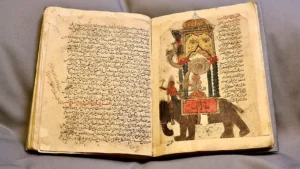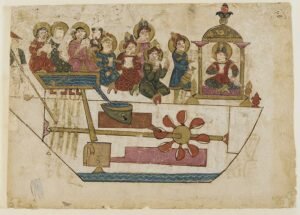Al-Jazari: The Father of Robotics

Al-Jazari, a 12th-century Muslim engineer, is hailed as “The Father of Robotics” for his groundbreaking work in automation and mechanical engineering. Serving the Artuqid court, he revolutionized water-raising devices, automata, and timekeeping inventions. His renowned manuscript, The Book of Knowledge of Ingenious Mechanical Devices, documented over 100 mechanical innovations, influencing later engineers, including Leonardo da Vinci. Al-Jazari’s legacy extends into modern robotics, proving that his genius transcends time, shaping today’s technological advancements.
Early Life and Education
Born in Upper Mesopotamia (modern-day Turkey) in 1136 CE, Al-Jazari showed an early aptitude for mechanics and engineering. Serving as the chief engineer in the Artuqid court of Diyarbakir, he gained practical experience in designing water systems and automata. Influenced by the Islamic Golden Age, he studied mathematics, hydraulics, and mechanical engineering. His deep understanding of mechanics allowed him to create intricate devices, blending artistry with functionality. His expertise earned him royal patronage, leading to the documentation of his inventions in The Book of Knowledge of Ingenious Mechanical Devices, a landmark in the history of engineering and automation.
Major Contributions
Al-Jazari’s most significant achievement was his renowned manuscript, The Book of Knowledge of Ingenious Mechanical Devices, which documented over 100 mechanical inventions. This comprehensive work provided detailed illustrations and instructions, serving as a crucial reference for engineers and inventors for centuries.
Among his many engineering advancements, Al-Jazari:
- Designed automata, including a musical band of mechanical drummers and automated drink-serving machines, showcasing early robotics.
- Developed advanced water-raising devices, including a reciprocating suction pump that introduced the crankshaft mechanism, later essential in modern machinery.
- Created intricate clocks, such as the Elephant Clock, which combined engineering with cultural symbolism.
- Improved hydraulic engineering, designing sophisticated water distribution and control systems for irrigation and city planning.
- Refined mechanical design, utilizing gears, valves, and camshafts to enhance automation and precision.
Beyond his mechanical innovations, Al-Jazari’s pioneering use of automation principles laid the foundation for modern robotics and mechanical engineering. His emphasis on practical application, combined with artistic craftsmanship, influenced later inventors, including Leonardo da Vinci. His work remains a testament to the ingenuity of medieval Islamic engineering and its lasting impact on modern technology.

Legacy and Influence
Al-Jazari’s impact on engineering and robotics remained influential for centuries. His book, The Book of Knowledge of Ingenious Mechanical Devices, provided foundational knowledge for mechanical design, inspiring engineers in both the Islamic world and Europe. His innovations, particularly the crankshaft mechanism, played a crucial role in the development of modern machinery and automation.
Today, Al-Jazari is recognized as a visionary engineer who merged art with mechanics. His contributions to hydraulics, robotics, and timekeeping paved the way for modern technological advancements. His work continues to inspire mechanical engineers, historians, and roboticists, securing his place as one of history’s greatest engineering pioneers.
Conclusion
Al-Jazari’s genius in mechanical engineering and automation cemented his legacy as The Father of Robotics. His groundbreaking innovations continue to influence modern technology, proving that his work was far ahead of its time. Studying his contributions offers valuable insights into the evolution of robotics and engineering.



